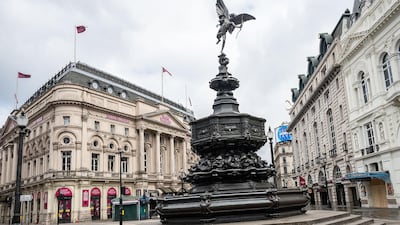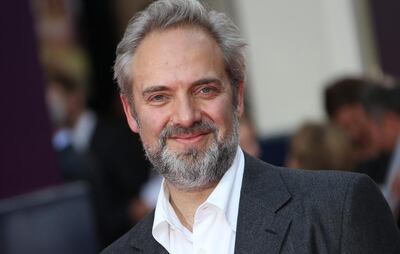When the actor Adrian Lester made an appearance at the artificial intelligence conference CogX on Wednesday, the obvious issue was whether the profession had any future beyond digital platforms.
The panel, called All the Web's a Stage: The Digital Future of the Performing Arts, could have been seen as prophetic. Lester recalled a discussion in New York when a British National Theatre production of Shakespeare was broadcast to an American cinema. What was the most anticipated aspect of broadcasting a live stage performance? "The collective experience is the thing that everybody concentrated on," he said.
During the panel, Lester and the playwright Kwame Kwei-Armah appealed to the technology industry to sustain support and collaboration with the arts as the industry faces tough times.
While broadcasts of stage plays have taken off in recent months as the Covid-19 threat confined people to their homes, the key element of live performance has been missing. An anxious debate has broken out over whether the industry itself can emerge from its shutdown.
Treasured worldwide as Theatreland, London's live venues have slipped into a fug of despondence since the government announced lockdown measures to control the pandemic in late March. Despite extensive government support, closures have already started.
“We are at the start, potentially, of a very worrying time for this sector, in which we lead the world,” said Julian Bird, the chief executive of the Society of London Theatre and UK Theatre. “Our latest survey told us that 70 per cent of theatres or production companies would run out of cash, go out of business, by the end of this year.”
Mr Bird cited the first few closures outside the capital, in Birmingham, Southhampton and Leicester, as the beginning of a progressive shutdown of the sector. As the end of the year grew closer, the list of closed facilities would grow longer.
One of the main hurdles for the industry is Britain’s two metre social-distancing rule. Mr Bird estimated that could bring the capacity of many theatres down to only 12 per cent. Even with a one metre rule – common in many countries – capacity of theatres could rise as high as only 35 per cent. However most modelling indicates that performances are not viable until capacity tops 60 per cent. “In the majority of cases, bar some short-term activity, it is uneconomic for most venues in the UK,” he said.
Sam Mendes, the Oscar-winning film director and former artistic director of London’s Donmar Warehouse theatre, has proposed government investments in production.
He pointed out that the crisis in the industry was the worst for 75 years and the risk was losing an audience of 34 million people, equally to the annual attendance at all Premier League and English Football League games.
"It would be deeply ironic if the streaming services – Netflix, Amazon Prime et al – should be making lockdown millions from our finest acting, producing, writing and directing talent, while the very arts culture that nurtured that talent pool is allowed to die," he wrote in an essay for the Financial Times.
In return for providing money, the government could take a stake of the subsequent revenue.
Leading institutions have put on virtual staging, including the National Theatre, the Royal Opera House and Glyndebourne. Audiences have been strong but a shift to pay-per-view models is seen as unlikely. Voluntary donations have been low. Creating a production from scratch is expensive so the industry has relied on archived recordings.
“That is not a long-term business model,” he said. “The nature of watching theatre is very different in and of itself.”
In London’s West End alone producers sell around 15 million tickets a year, more than any other city or any other country in the world. Around one third of the audience is made up of overseas tourists. Theatre goers spend five to six times the ticket price in the immediate area of the venue, at restaurants and in shops, for example.
In another hurdle for the industry, Britain introduced a mandatory quarantine for travellers arriving at its ports and airports.
Despite the overall gloom, The Old Vic in London put tickets on sale on Wednesday for a live online performance of the play Lungs starring actors Claire Foy and Matt Smith.
So prevalent has the switch to online been that The Old Vic looks like a trailblazer. The actors David Tennant and Michael Sheen did a TV special on acting in a comedy via Zoom that aired on Wednesday.
Perhaps it's time to invert the premise by acting on the stage for a virtual (paying) audience. One day the two men might even perform it in the round for a packed house.












